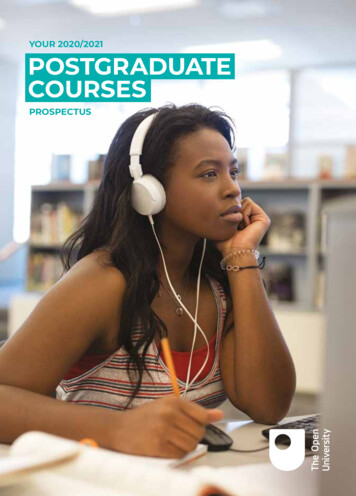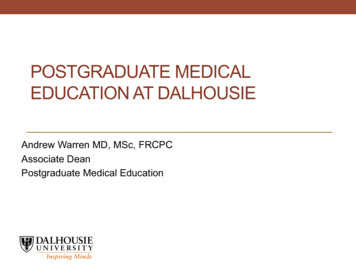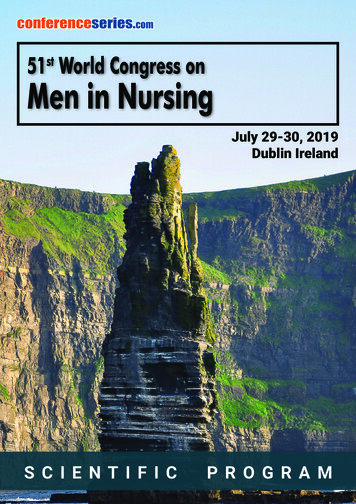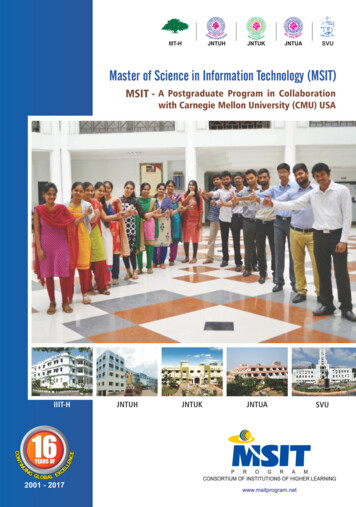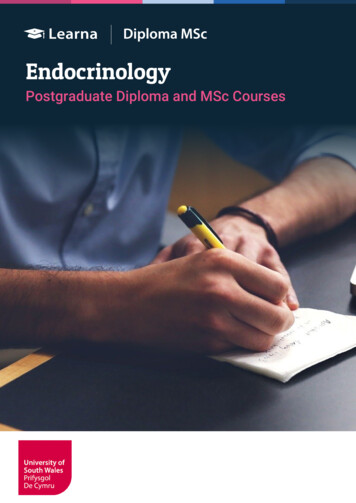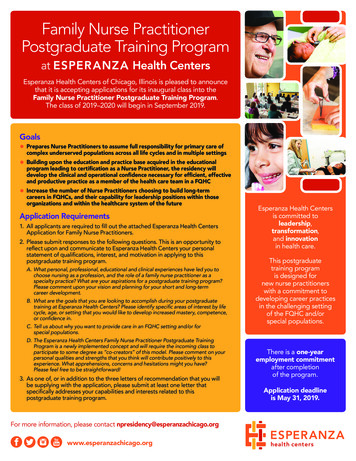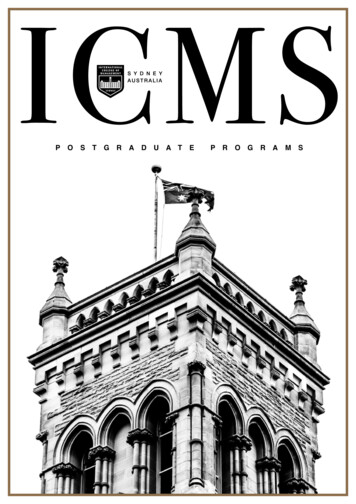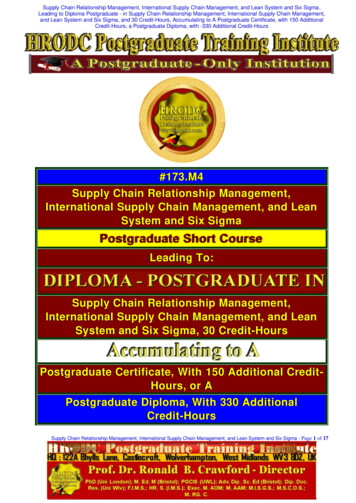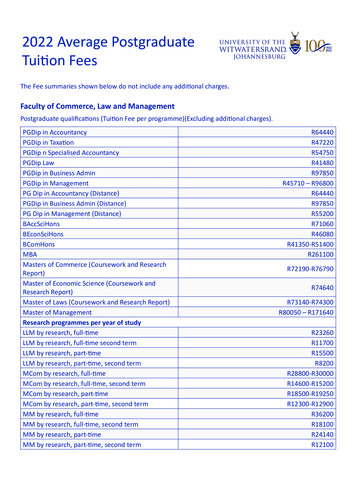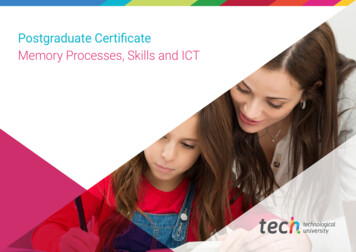
Transcription
Health SA GesondheidISSN: (Online) 2071-9736, (Print) 1025-9848Page 1 of 9Original ResearchChallenges experienced by postgraduate nursingstudents at a South African universityAuthors:Yolanda Havenga1,2Malmsey L. Sengane1Affiliations:1Department of NursingScience, Sefako MakgathoHealth Sciences University,South AfricaAdelaide Tambo School ofNursing Science, TshwaneUniversity of Technology,South Africa2Corresponding author:Yolanda Havenga,havengay@tut.ac.zaDates:Received: 01 Feb. 2018Accepted: 01 Feb. 2018Published: 29 Mar. 2018How to cite this article:Havenga, Y. & Sengane, M.L.,2018, ‘Challenges experiencedby postgraduate nursingstudents at a South Africanuniversity’, Health SAGesondheid 23(0), ight: 2018. The Authors.Licensee: AOSIS. This workis licensed under theCreative CommonsAttribution License.Background: The increase in nurses enrolling in postgraduate programmes as well as theneed to improve their completion requires academics to establish environments conducive forpostgraduate studies. The challenges experienced during postgraduate studies have to beidentified to establish conducive environments.Objective: The objective of this study was to explore and describe the challenges experiencedby postgraduate nursing students enrolled in postgraduate coursework and researchprogrammes at a South African university.Methods: An exploratory, descriptive and qualitative design was used. The study wascontextual in nature. Purposive sampling was used. Fifteen honours, master’s and doctoralstudents participated in the study. Data were analysed through qualitative content analysisand measures to ensure trustworthiness, and ethical implementation of the study wereimplemented.Results: Three themes with categories were identified, namely personal challenges (i.e.finances, employment, family and accommodation), academic and institutional challenges(i.e. workload and time constraints, contact sessions, subject information and assessment)and research-related challenges (i.e. information literacy, supervisory relationship andsupervisory structure and process).Conclusion: Institutional support addressing personal, academic and research-relatedchallenges should be provided to enhance student experiences and completion.IntroductionInternationally, there has been a gradual increase in the number students enrolling intopostgraduate programmes (Symons 2001). This has also been the case for postgraduate nursingprogrammes (Honey, North & Gunn 2006). The increased interest by nurses to enrol forpostgraduate studies is motivated by internal and external motivators (Cleary, Hunt & Jackson2011; Honey et al. 2006; Perna 2004).On a professional level, nurses are motivated to obtain higher qualifications as it enablesthem to progress to more senior positions, enhances their occupational status, improves workingconditions, decreases the likelihood of unemployment and enables salary increases and higherlifetime earnings (Cleary et al. 2011; Honey et al. 2006; Perna 2004). Personal motivation is relatedto enjoyment of the learning experience and increased social status (Perna 2004). This increasedmotivation for postgraduate qualifications in nursing creates a demand for it to be offered (Honeyet al. 2006) and increased capacity to do so at universities.In South Africa, the introduction of the Occupation Specific Dispensation (OSD) in 2007 (PublicHealth and Social Development Sectorial Bargaining Council 2007) for public sector employeeswas first rolled out with nurses. Since the implementation of the OSD, increased interest has beenobserved by the authors among nurses obtaining those specialised nursing qualifications thatwould enable them to access the OSD.Read online:Scan this QRcode with yoursmart phone ormobile deviceto read online.This increased motivation for postgraduate degrees and post-basic diplomas create a demand forit to be offered at universities (Honey et al. 2006). Postgraduate programmes are consideredconduits through which universities develop research capacity and also generate advanced skillsneeded (Mutula 2011). There is a need for nurses prepared in specialist and advanced nursingknowledge and skills in various nursing specialities (Honey et al. 2006). By enhancing thecompetency of nurses through postgraduate programmes, nursing would be enabled to meethttp://www.hsag.org.zaOpen Access
Page 2 of 9the complex and global health needs of individuals, familiesand communities (Mutula 2011), enhance the quality ofnursing care and address the shortage of health professionals(Essa 2011).In South Africa, nursing as a practice profession requiresboth practice experts and nursing scientists to expand thescientific basis of patient care. Doctoral and master’seducation programmes prepare nurses for advanced practice,leadership and scientific enquiry (American Association ofColleges of Nursing 2006). Furthermore, it is essential thatnew nurses are prepared with higher academic qualificationssuch as doctoral degrees in order to replace the leaders whowill retire (Cleary et al. 2011). Unfortunately, master’s anddoctoral degree programmes in nursing do not produce alarge enough pool of postgraduate degree nurses to meet thedemand (Rosseter 2012).The pool could be increased in part by improving theenrolment, retention and completion of postgraduatestudents. Student retention and completion are key concernsat institutions of Higher Education both in South Africa andinternationally (Essa 2011; Maasdorp & Holtzhausen 2011).Higher education institutions (HEIs) are under pressure toensure acceptable completion rates and research outputsagainst which their success and efficacy are measured (Essa2011) and subsidised (Department of Higher Education andTraining 2015). In the National Plan for Higher Education,planning was done for the increase of graduate enrolmentsand outputs at the master’s and doctoral levels (Departmentof Education 2001). Higher education institutions wererequired to indicate their strategies to improve their graduateoutputs (Maasdorp & Holtzhausen 2011).Problem statementChallenges and negative experiences influence postgraduatestudents’ non-completion (Choo 2007; Essa 2011). Academicsare responsible for establishing and maintaining academicenvironments that are conducive to learning and research bypostgraduate students (Maasdorp & Holtzhausen 2011), and toensure that postgraduate students complete their studieswithin a reasonable time (Haksever & Manisali 2000). It istherefore imperative that HEIs and nursing departmentsexplore and address the context-specific challenges relatedto the retention and completion of postgraduate nursingstudents. The authors heard of challenges postgraduatestudents were experienced, and were concerned about thedropout and slow completion by these students. The specificuniversity management indicated that it was necessary toattract a pool of young researchers and provide researchconducive environments for postgraduate students wherethey would be able to flourish. Postgraduate training andsupport were proposed to assist with creating more conduceenvironments (Anon 2011). In order to provide such supportand create environments where postgraduate studentscould flourish, needs and challenges have to be understood(Benshoff, Cashwell & Rowell 2015). The authors set out tounderstand the context-specific challenges experienced byhttp://www.hsag.org.zaOriginal Researchthese postgraduate nursing students in a specific university,as these challenges were not yet explored and seemed to affectthese postgraduate students.Definition of termsChallengesA challenge can be referred to as a ‘difficult task’. It issomething that requires great physical and mental effort tobe done successfully and thus tests a person’s ability(Cambridge University Press 2017a). In this study, the term‘challenge’ refers to that which tests postgraduate students’abilities to succeed in their nursing studies - a situation theyare faced with that needs great mental or physical effort inorder to be done successfully and therefore tests the postgraduate student’s ability.Postgraduate nursing studentsA postgraduate refers to a person who already has onedegree and studies at a university for a more advanceddegree (Cambridge University Press 2017b). In this study, apostgraduate nursing student refers to a student who studiesfor a more advanced nursing qualification such as honours,master’s and doctoral degrees on National QualificationFramework (NQF), levels 8, 9 and 10 (Council on HigherEducation 2013).UniversityA university is the place where a person studies for anundergraduate (first) or a postgraduate (higher level) degree(Cambridge University Press 2017c). In this study, a universityrefers to a specific HEI where nursing students study towardshigher level degrees.Methods and materialResearch designAn exploratory, descriptive and qualitative design was used(Polit & Beck 2012), as the researchers attempted to gain a firsthand and holistic understanding of the challenges experiencedby the participants in relation to their postgraduate studies.The study was contextual in nature. The qualitative descriptivedesign is based on the constructivist paradigm and is eclectic,as it uses or adapts research methods from other qualitativeresearch designs (Polit & Beck 2012).SettingThe study was contextual in nature (Botma et al. 2010)and was conducted in a nursing department of a specificuniversity situated in South Africa. The nursing departmentoffers various residential postgraduate programmes on apart-time and full-time basis. The postgraduate degreeprogrammes offered are honours (NQF 8), master’s (NQF 9)and doctoral degrees (NQF 10) (Council on Higher Education2013) in the following specialisations: Midwifery, PsychiatricNursing, Community Health Nursing, Nursing ManagementOpen Access
Page 3 of 9and Nursing Education. Coursework implied attendance ofclasses for a 2-week period four times per year, writing testsand examination papers, and practical nursing skills beingassessed. All postgraduate students complete a researchcomponent and are allocated a supervisor and a co-supervisorto guide them through the research process.Population and samplingThe study population consisted of all postgraduate studentsregistered during 2011 for a nursing degree at the university.There were 56 postgraduate students registered in 2011,consisting of 15 honours degree students, 27 master’sdegree students and 14 doctoral degree students. Purposivesampling was used (De Vos et al. 2011; Polit & Beck 2012)by sending the request to write a narrative report viaemail to all registered postgraduate students who had beenregistered for a minimum of 6 months and had an emailaddress. All 56 students had been registered for a minimumof 6 months, as registration took place during January2011 and data were collected in October–November 2011. Aminimum of 6 months registration as a postgraduate studentwould ensure that all participants had drafted a proposaland had contact with their supervisors. They also wouldhave attended a minimum of two of the four contact sessionsfor the year. Sampling continued and data were collecteduntil saturation was achieved (Polit & Beck 2012), evidencedby repetition of themes.The total number of participants was 15. The number ofstudents per programme and whether they were full-time orof part-time are presented in Table 1.Data collectionParticipants were requested via email to write a self-reportingnarrative on the central question: Please describe thechallenges you experience as a postgraduate student.In order to increase credibility of data and to determinethe appropriateness and usefulness of the central question,it was piloted with two participants who formed part ofthe population, but were not included in the main study(De Vos et al. 2011). After piloting, the question was deemedappropriate to collect the data that would answer the researchquestion and was used to gather the data.Each student was sent a participant information leaflet, aconsent letter, biographical information questions and thecentral question, and was asked to write the self-reportingnarrative. The initial email was followed up by three reminderemails. Raw data were received by a research assistant viaemail.TABLE 1: Demographic characteristics of participants.ProgrammeNumber of studentsFull-time/part-timeDoctoral33 Part-timeMaster’s75 Part-time2 Full-timeHonours53 Part-time2 Full-timehttp://www.hsag.org.zaOriginal ResearchData analysisThe research assistant combined all data and grouped themunder the headings ‘honours students’, ‘master’s students’and ‘doctoral students’, after which the data were providedto the two researchers who conducted the analysis. Thedata were analysed by using qualitative content analysis - amethod ascribed to more general qualitative methods (Polit& Beck 2012).All participant responses were read as a whole. Then thestudent challenges were read and analysed separately forthe honours, master’s and doctoral students. The themesand categories of the three programmes were comparedand similarities and unique experiences were identified.The findings for all the participants were then combined.The frequency whereby participants mentioned challengesduring the interviews was counted to highlight the categoriesthat were the greatest and the least challenging for studentsof different programmes and for students who were parttime and full-time (Table 2). The data were analysed by bothauthors and consensus was reached on the identified themesand categories.TrustworthinessQuality of the study was enhanced by implementing specificstrategies based on Lincoln and Guba’s criteria (1985). Toenhance trustworthiness of the study, credibility of the studywas enhanced by purposive sampling, ensuring saturationof data, and analysis triangulating by two researchersanalysing the data and reaching consensus on the identifiedcategories (Holloway & Wheeler 2010:308). Dependability andconfirmability of data were enhanced through well-keptdocumentation and transparency in the methodology,data analysis and conclusions. Transferability was enhancedby obtaining responses from 15 participants and confirmingthat saturation was achieved. Written responses byinterviewees and including verbatim quotes from participantsin the description of findings enhanced the authenticity of thestudy (Holloway & Wheeler 2010; Polit & Beck 2012).Ethical considerationThe Belmont report’s ethical principles and guidelines forthe protection of human subjects of research were used toguide the study. These principles included respect for persons,beneficence, non-maleficence and justice (Polit & Beck 2012).Ethical clearance was obtained from the Research EthicsCommittee of the specific university and permission wasobtained from the head of the Nursing Department. A researchassistant engaged with participants via email so that theirresponses could not be linked to specific names. The researchassistant was a postgraduate student who did not participatein the study and agreed to keep the information confidential.All students were informed that participation was voluntaryand that they could withdraw from the study withoutany consequences to them. Anonymity and confidentialitywere ensured by omitting names from any documents.Open Access
Page 4 of 9Original ResearchTABLE 2: Frequency of challenges mentioned in the data.Themes and TotalAFRF (%)AFRF (%)ABRF (%)AFRF (%)AFRF (%)AFPersonal commodation150150000021002Academic and institutional1257943001048115221Workload and time constraints240360002403605Contact sessions240360003602405Subject information and Information literacy110000000011001Supervisory relationships000031003100003Supervisory structure and tes: Actual frequency (AF) represent the number of times the theme (in bold) was mentioned in the interviews. Relative frequency (RF) represents the percentage of the total actual frequencya theme (in bold) and a category was mentioned. Lines in bold represent the total AF and RF for each theme, respectively, and in the last row, for all the themes combined.AF, actual frequency; RF, relative frequency.The participants were also informed that the results of thestudy may be published.FindingsThree main themes were identified in the data, namelypersonal, academic and institutional, and research-relatedchallenges. There were 48 mentions of challenges by the 15participants. The most frequently mentioned challenge wasacademic and institutional challenges (21 times), followed bypersonal challenges (18 times) and research-related challenges(9 times).For each of the three themes, categories were identified asindicated in Table 2.Table 2 furthermore indicates the actual (AF) and relativefrequency (RF) with which challenges were mentioned foreach theme and category. Doctoral students focussed more onsupervisory challenges, master’s students more on personalchallenges, and honours students more on academic andinstitutional challenges. It must however be considered thatthe number of participants per category were not equal.Each of the themes will now be discussed.Theme 1: Personal challengesPostgraduate students reported that they experienced variouspersonal challenges during their enrolment for postgraduatestudies which were related to finances, employment, familyand accommodation. Personal challenges are challenges thatpertain to the student in his or her personal environment.Students in all three programmes mentioned personalchallenges.FinancesFinancial challenges related to travelling expenses, studentfees, printing, copying, data bundle purchases and money toconduct the research such as travelling to data collection sitesand classes.http://www.hsag.org.zaParticipants also experienced challenges in paying studentfees, which they perceived as exorbitant, as a master’sstudent explained: ‘The fees are very expensive for noclear reason’ (part-time, master’s student). The participantsreported difficulty in accessing scholarships, as they hadno knowledge about funding opportunities and were notcertain how to access this information.A further financial challenge was reported on printing ofassignments and journal articles which was a hugely costlyexercise as explained by a full-time master’s student. Thepart time master’s and honours students also reported thataccessing electronic material and their emails as studentsliving off campus, was costly, as they had to purchase databundles to access the information.A part time doctoral student explained the cost of travellingfor supervision: ‘The cost of travelling more than 400 kmfor a [supervision] contact session of less than an hour ’With regard to the fees, one part time master’s student said:‘The fees are very expensive for no clear reason.’The financial burden when living away from home andstudying was explained as follows: ‘As a full-time student, Imeet financial constraints to cover printing costs, photocopyingcosts, meals and all other costs as everything requires money’(full-time, master’s student 3). Another full-time master’sstudent explained: ‘The study is very costly, e.g. using internetfor consultation, and driving around looking for patients as[anonymous hospital] does not have patients anymore.’ Thisparticipant is referring to the patient interventions that have tobe completed for the clinical practical part of both the honoursand master’s programmes.EmploymentThe only category mentioned by all three programmes wasemployment challenges (see Table 2). Employment challengeswere related to the high workload at their places of employmentand some students not being granted leave or study leaveto pursue their postgraduate studies. These students often didOpen Access
Page 5 of 9so by using their personal leave or working night duty prior toattendance so that they could use their days off. A part-timemaster’s degree student explained: ‘Part time makes it hardfor me to manage my schooling and work.’ Workload andworkplace arrangements were not mentioned as a challengefor full-time students (see Table 2), as they were granted studyleave from their places of employment.The challenge with regard to balancing academic andemployment responsibilities was explained by one of theparticipants in the following quotations: ‘Huge workloadat the place of employment, which does not allow for sucha pattern of contact supervision and other massive academicand administrative programmes’ (part-time, doctoral student).Another doctoral student said:I raised my concern about the workload at my place ofemployment (with supervisor) and we both felt that sabbaticalleave could be an answer although it’s beyond our control.(Part-time, doctoral student)FamilyThe participants felt that they had to attend to their familyresponsibilities such as their children’s needs which impactedtheir time, energy and ability to focus on their studies. Someparticipants experienced feelings of guilt as they were notalways available when their children required their assistance.As explained by participants in the following quotations:‘When at home I still have to study and the children feelleft out’ (full-time, master’s student). Two students said: ‘Itcomes with a price of not having sufficient time for yourfamily’ (part-time, master’s student) and ‘I’m too tired whenI get home, I don’t have enough time to do school work withthe kids’ (part-time, master’s student).AccommodationOne of the challenges experienced by part-time and full-timestudents was the lack of available accommodation on campusfor students. Many students were not living in the sameprovince where the university was situated and had to traveland sleep over to attend contact sessions. They had to relyon family members or other students, or make use of guesthouses in the area for accommodation. As explained by oneof the participants:I have a challenge of finding accommodation inside the campus.I have to look around the nearby location for accommodation.The standard of living conditions is too low outside the campus.(Full-time, honours student)Theme 2: Academic and institutional challengesThe academic and institutional challenges were related tothe academic workload and time constraints, the structureof contact sessions, subject information and assessmentprocess. These challenges were mentioned most frequentlyby honours students followed by master’s students. Themention of academic and institutional challenges was nearsimilar between part-time and full-time students.http://www.hsag.org.zaOriginal ResearchWorkload and time constraintsThe participants reported on the high workload because of thelarge amount of theoretical and practical requirements theyhad to adhere with limited time to do so. They also expressedfrustration about the limited time to interact with fellowstudents. The high workload, programme information andassessment matters were only mentioned by the honours andmaster’s students, as doctoral students did only researchand matters such as practical objectives, study guides andassessments were not relevant to them (see Table 2).One participant explained:The challenge that I have experienced is that this course that I’mdoing needs more time and that to be a part time student makesit hard for me to manage my schooling and work. (Part-time,master’s student)Another participant said: ‘Time for practica for part timersis very limited and it is difficult to complete all the practicalwork in time’ (part-time, master’s student). Students suggestedthat for the required practical competencies to be moremanageable, the requirements had to be reduced: ‘The practicalshould be reduced by at least half’. (Part-time, honours student)Students expressed their frustration about the lack of studentinteraction and support between peers in class which theyattributed to time constraints as explained by the followingmaster’s and honours degree students:[There is] no time to come together with colleagues to discuss thecoursework. (Part-time, honours student)Limited time of interaction with fellow scholars due to limitedtime at campus together. (Part-time, masters student)Contact sessionsThe rigidity in the method of offering contact sessionschallenged students. Some of the honours and master’sstudents were permanently employed and could not alwaysavail themselves on the set dates for contact on campusbecause of their work commitments.There was a need for restructuring the offering of themasters and honours programmes with inclusion of afterhour classes as seen in the following quotes:‘Classes should be offered after-hours, e.g. 17h00–20h00 in theevenings or even on Saturdays’. (Full-time, honours student)[The programme] ‘lacks after-hours/Saturday classes’. (Parttime, master’s student).Some of the students expressed their challenges regarding thelack of contact with their subject lecturers during clinicalpractical placement and experienced contact once a weekduring these times as inadequate. They would prefer a clinicalmentor to be available throughout during their practicalplacement as these master’s and honours students explained:Another challenge is [the] lack [of ] physical contact with [a]clinical mentor at [the] clinical area, there is no physical contactwhen stuck; the only way to communicate is through technology[email]. (Full-time, honours student)Open Access
Page 6 of 9Subject information and assessmentChallenges related to the adequacy of the informationstudents received about the programme were experienced.Some students indicated to have received inadequateprogramme information in some of the programmes whichimpacted their ability to prepare and plan to address the highworkload.As explained:‘The study guides are not adequately prepared and organised’.(Part-time, master’s student)The same student said:‘Some lecturer[s] does [do] not have study guides which describetheir year plan such as assignments and their submission dates’.Some students were challenged by the delayed feedbackthey received from assessors or supervisors as well as by thestructure of feedback given. They explained that assessmentand research feedback did not promote their growth anddid not give them an opportunity to improve by the nextassessment. One student said: ‘The feedback being given[in some] module[s] does not develop one professionally asyou are not told what you were supposed to do to improve’(Full-time, honours student).To meet all assessment expectation for the practicalcomponents of the honours and master’s programme, someof the participants stated that the areas where they wereplaced did not provide adequate opportunities. Thesestudents had to consequently search for clinical learningopportunities outside of their clinical placements facilities, asone full-time master’s student participant explained: ‘Thereare no groups and families [for assessment of group andfamily therapy skills] in anonymous institution.’Original Researchlibrary searching for reading materials’ (full-time, honoursstudent).Supervisory relationshipParticipants felt that some of the supervisors lacked passionfor supervision, were unapproachable and rigid, and had anegative attitude towards them. These frustrations werevoiced by mostly doctoral students:The feeling that one perceives during the supervision is that oneis being done a favor or is a burden, in spite of an appointmentthat has been made with that supervisor, e.g. a supervisor remindsone of the other appointments that he/she has with the otherstudents or other people whilst the discussion is going on, whichreduces [the students’] focus, motivation and concentration.(Part-time, doctoral student)Another student explained: ‘[The] supervisor often does notrespond to the e-mailed work and when reminded he/shesometimes shows less regard ’ (Part-time, doctoral student)and:Lack of evidence of passion for supervision from [the] supervisor,hence as a student you feel as if you are a burden, with little orno external motivation from [the] supervisor. (Part-time, doctoralstudent)Structure and process of supervisionChallenges in the supervision process and structure includedlate allocation of supervisors to students, lack of structureregarding supervision feedback as well as the perceivedlengthy process for approval of research protocols. This wascited by some participants (mostly doctoral students) in thefollowing quotations:‘Not having a proper system for feedback and meetings.’ (Parttime, doctoral student 3)‘Sometimes not receiving feedback in time.’ (Part-time, doctoralstudent 3)Theme 3: ResearchThe honours, master’s and doctoral students who wereengaged in research activities explained that they hadchallenges with regard to information literacy and supervision.One honours student mentioned a challenge related toinformation literacy. Despite honours students also doing aresearch component, they did not mention any supervisorychallenges. Supervisory challenges were mentioned by onemaster’s student and all three participating doctoral students.Information literacyThe challenges experienced with information literacy relatedto the participant’s inadequate computer literacy and abilityto access articles and other media electronically.The participants reported that, prior to their enrolment inthe postgraduate programme, they were not sufficientlycomputer literate and did not know how to access electronicliterature. A honours participant also did not know howto independently access literature such as subject journalselectronically on or off campus. One of the participantsindicated: ‘Another challenge is the use of [a] computer inhttp://www.hsag.org.za‘Sometimes you leave the session confused because of a mammothtask to be
1Department of Nursing Science, Sefako Makgatho Health Sciences University, South Africa 2Adelaide Tambo School of Nursing Science, Tshwane University of Technology, South Africa Corresponding author: Yolanda Havenga, havengay@tut.ac.za Dates: Received: 01 Feb. 2018 Accepted: 01 Feb. 2018 Published: 29 Mar. 2018 How to cite this article:
